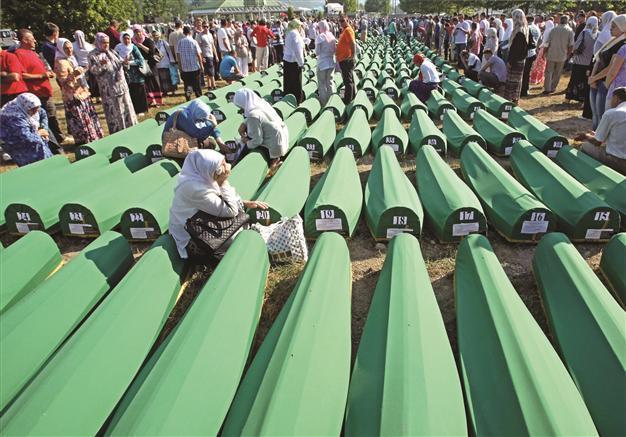Turkey condems Srebrenica massacre on 17th anniversary
SREBRENICA

Women weep over caskets at the Potocari Memorial Center during the funeral in Srebrenica, where 520 newly-identified Bosnian Muslims were buried. A man places Bosnian coffee cups, each of them symbolizing the victims of the Srebrenica massacre, during a memorial ceremony mark the 17th anniversary of the massacre in Istanbul. EPA photo
Bosnians yesterday buried 520 newly-identified victims of the 1995
Srebrenica massacre, with the two alleged masterminds of the slaughter finally on trial for
genocide.
Some 30,000 Muslims traveled to a memorial center in Srebrenica,
Bosnia, yesterday to bury the victims – from among the 8,000 Muslim men and boys slaughtered in July 1995 by Serb forces.
After speeches and the Muslim prayer for the dead, people began hoisting the simple coffins covered in green cloth to carry them to the freshly dug graves.
Turkish Prime Minister Recep Tayyip Erdoğan said yesterday that Turkey would never forget the Srebrenica massacre that had happened at the heart of Europe, during a speech at his party’s meeting in Ankara. Recalling that Turkish Deputy Prime Minister Bekir Bozdağ attended the ceremony in Bosnia-Herzegovina representing Turkey, Erdoğan said Turkey was committed to protecting the Bosnians.
Turkey condemns massacreBozdağ visited the Potocari Memorial Center and a nearby museum. Bozdağ said that July was “the month of sorrow” for Bosnia-Herzegovina. “We are here to share pain of our brothers and sisters in Bosnia-Herzegovina,” he said. In a statement yesterday, the Turkish Foreign Ministry also condemned attempts to deny or underestimate the significance of the massacre. A group from the Young Bosnians Association also held a memorial ceremony in Istanbul’s Taksim Square, filling cups with coffee to represent those killed in Srebrenica.
Srebrenica was a U.N.-protected Muslim town in Bosnia besieged by Serb forces throughout Bosnia’s 1992-95 war. Serb troops, led by Gen. Ratko Mladic overran the enclave in July 1995, executed 8,372 men and boys in just a few days. Dutch troops stationed in Srebrenica as U.N. peacekeepers were failed to stop the slaughter. The bodies of the victims are still being found in mass graves throughout eastern Bosnia. So far 5,325 Srebrenica massacre victims found this way have been laid to rest. Mladic and political leader Radovan Karadzic have gone on trial at the U.N. war crimes court.
World leaders also rejected any moves to down play the scale of the massacre. “The U.S. rejects efforts to distort the scope of this atrocity, rationalize the motivations behind it, blame the victims, and deny the indisputable fact that it was genocide,” U.S. President Barack Obama said in statement. His remarks were a clear swipe at
Serbia’s new President Tomislav Nikolic, who said last month that the killings constituted “grave war crimes” but not genocide. But for many survivors and relatives in Srebrenica, the trials at the International Criminal Tribunal for the former Yugoslavia (ICTY) are too little, too late. They fear Karadzic, 67, and Mladic, 70, could die before any verdict is delivered.
murder, mass massacre,
